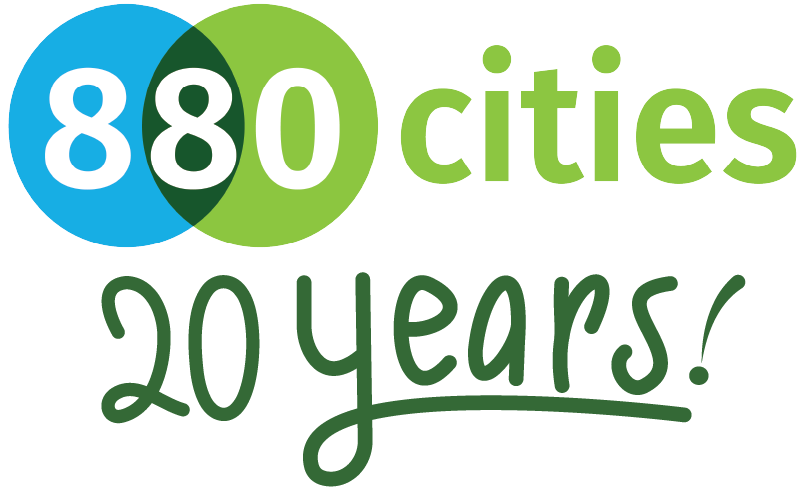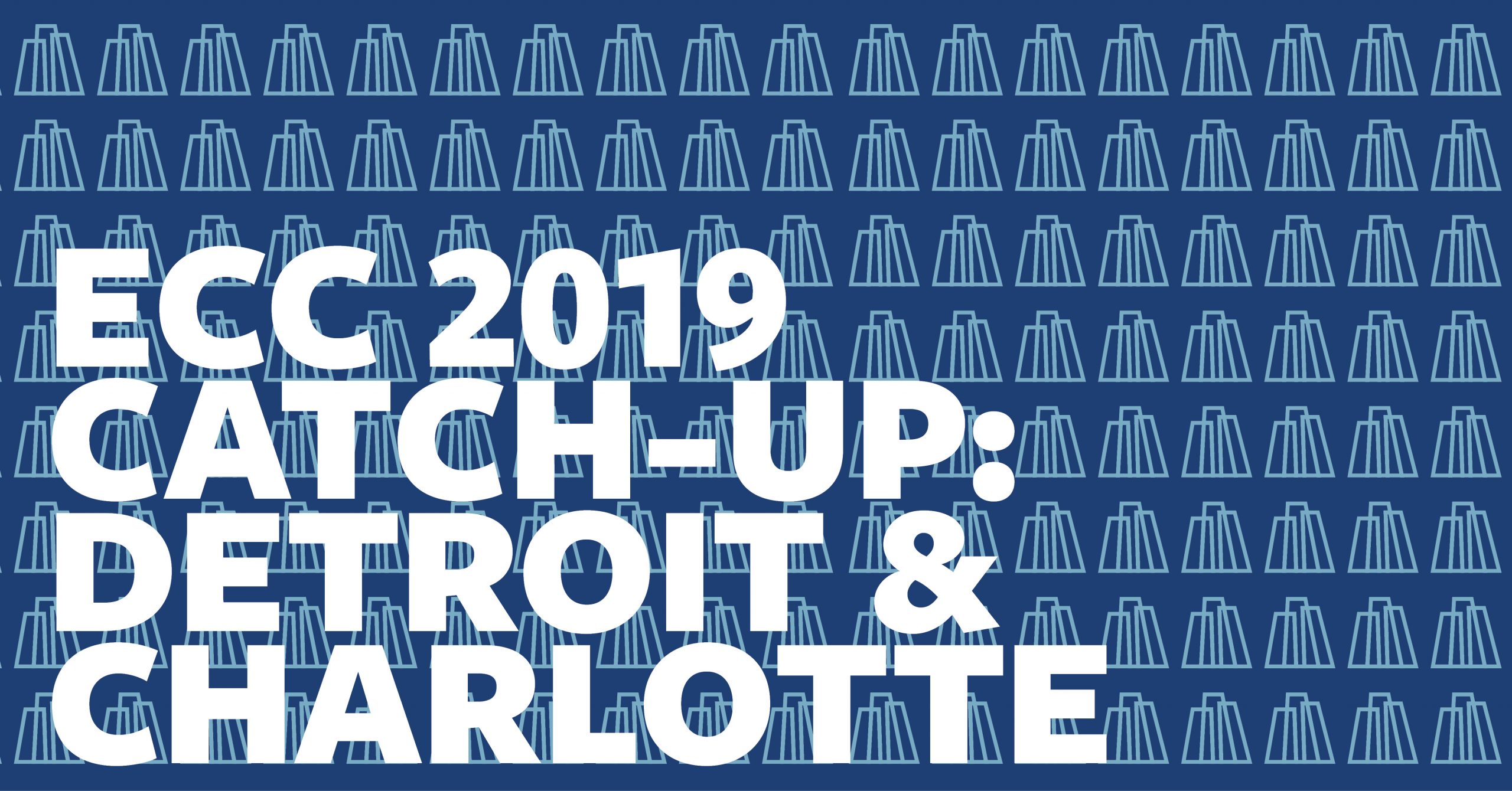
31 Aug ECC 2019 Catch-Up: Detroit & Charlotte
Emerging City Champions (ECC) is a fellowship program led by 8 80 Cities. ECC provides young civic innovators with leadership training and $5,000 in seed funding to launch transformative projects to enhance public space, urban mobility or civic engagement in their city. ECC is supported by the John S. and James L. Knight Foundation. Visit emergingcitychampions.org for more.
We just launched ECC 2020, and now we’re spending this week catching up with the ECC 2019 cohort to learn about what they accomplished during their 2019-2020 fellowship amidst the COVID-19 pandemic and mass movements for racial justice.
Detroit, Michigan
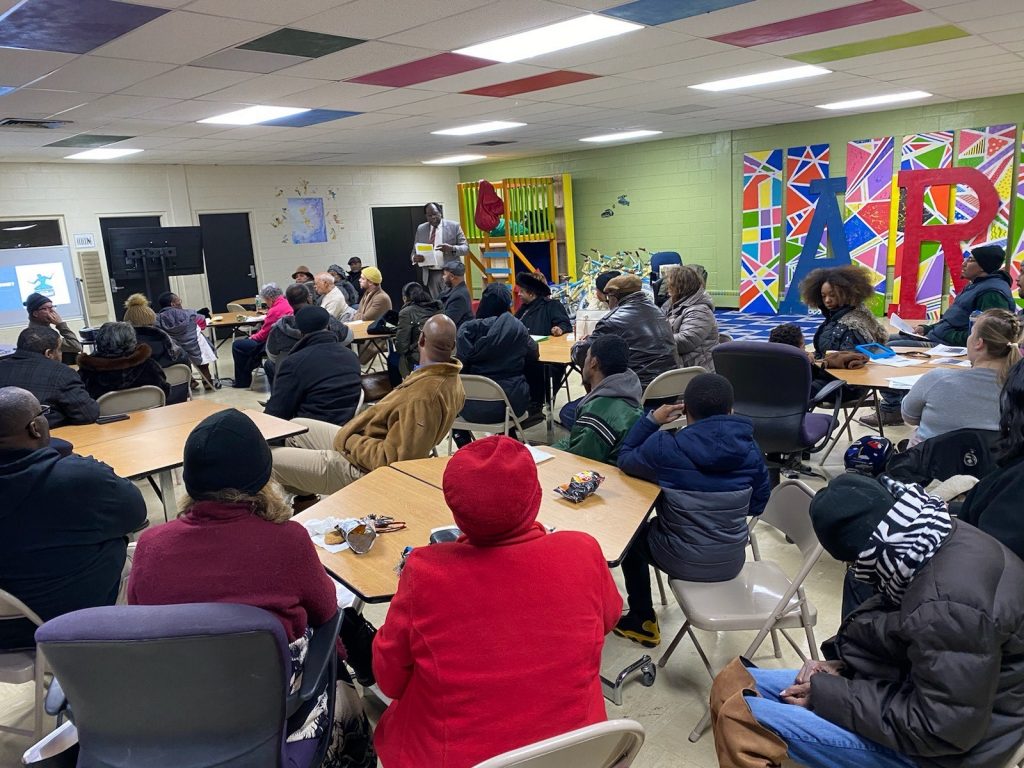
Image c/o Briana Mason
Engaging with a diverse range of clients including residents, stakeholders, non-profit organizations, and local officials, Briana Mason has been working to improve quality of life for Detroiters. She has a Bachelor’s Degree in Political Science from Howard University and a Master Degree in Urban Planning from Eastern Michigan University. She currently serves as an Urban Planner working in neighborhoods on Detroit’s West Side. She has a passion for creating beautiful and inclusive cities and truly feels that there is no other path as rewarding as this one.
Since working for the City of Detroit, Briana has worked with over 150 residents on the Russell Woods and Nardin Park Neighborhood Framework Plan, a year and a half long planning study which culminated with short and long term recommendations. The Emerging Cities Champions Fellowship gave her the opportunity to make a short term goal for residents a reality. Her ECC project, Reviving Dexter, is a short term initiative to program the vacant lots along Dexter Avenue and Tyler Street. Residents want to see Dexter beautiful and thriving. The Dexter Avenue corridor has not seen much investment in a long time and a top priority for residents is to revive the once vibrant Dexter corridor with small businesses, entrepreneurs, and art. Lorcan O’Herlihy Architects and Design Workshop worked as consultants to design an initial vision for a new shipping container marketplace. The ECC grant is being used to create an art installation with residents and the local artist, Dabls, that will be installed in the marketplace.
In February 2020, there was a kick off/visioning session with local stakeholder groups to determine art themes residents would like to see. COVID-19 has slowed in-person meetings, but Briana’s team plans to complete engagement by Spring 2021. They hope that the art installation can be installed in Summer 2021. KEO and Associates is working with residents and the City of Detroit to further design the shipping container marketplace. Possible programming types for the marketplace already mentioned by residents for the vacant lots included food trucks, farmers markets, and music/art festivals. Programming the vacant lots on Dexter will create a beacon of new and old memories for residents while bringing positive attention to the area and potential business owners. After all, residents have invested their lives in these neighborhoods and want to see the corridor thrive again.
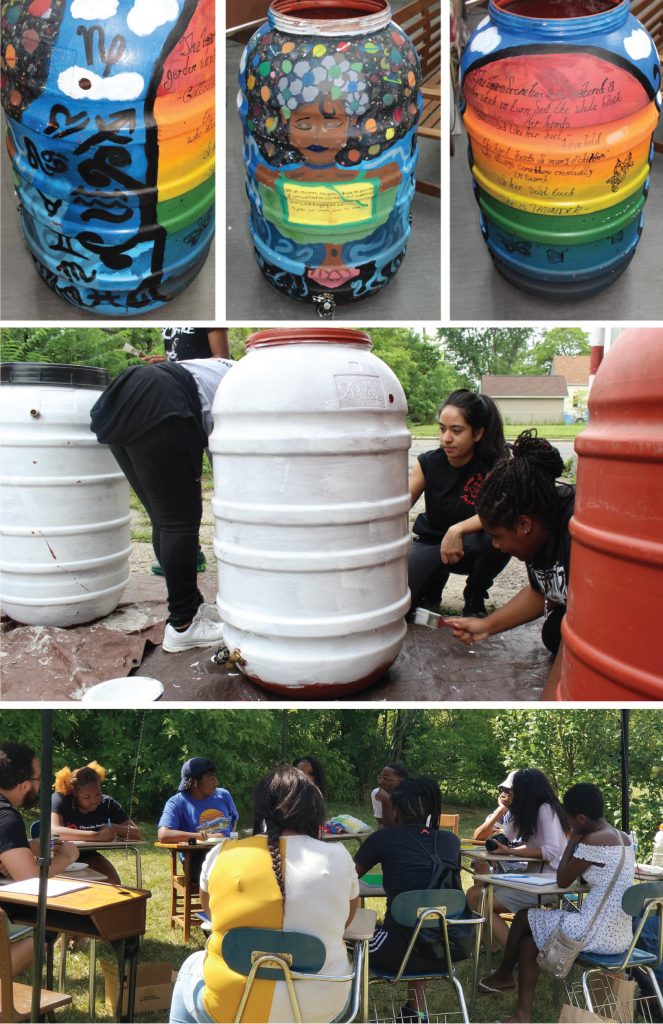
Image c/o Jamii Tata
Jamii Tata is a writer and educator who utilizes creative writing, performance poetry, audio production, self-publishing and entrepreneurial training as Literacy Learning tools to educate inner city youth in community spaces.
His project, 50 Banners, 50 barrels, sought to create 50 poetry banners and 50 poetry rain barrels adorned with community poems about Detroit resilience, displacement, water, land, food and farming, self-determination, and Blackness. So far, the project has amassed about 35 community poems and 20 poetry barrels. A snippet of the latest community poem, “Sunshine,” can be found below:
In spite of intermittent social distancing blues
We choose to look forward to the light emerging from within
My brightness cannot be contained nor will it be refrained
Through the gloomiest of circumstance this little light of mine, I’m going to let it shine
Shine so that the world can see
How special and beautiful community can be
Let our inner light lead the way and illuminate a brand new day
A world in which we all can thrive
Just like sunshine, still we rise
The community poem writing process involves community conversations and solutionary dialogue about how to create the world that participants want to live in. The essence of those conversations is captured through creative writing in which everyone, no matter their skill level, becomes a contributing author providing 2 or more lines to the community poem. The poems inspire the art designed on the rain barrels. The words of the poems are added to the barrels to create a page of a new kind of book for the community. Free standing banners act similarly to uplift the people’s collective voice. The Bikes Barrels & Books Fair, The North End Urban Expressions Festival: The Healing and the Sidewalk Festival in Detroit are a few spaces the barrels have visited. The banners and barrels are paired with opportunities for the public to interact with the display in in-person and online exhibits to continue collective dialogue and visioning of the world that the community poets will create.
Charlotte, North Carolina
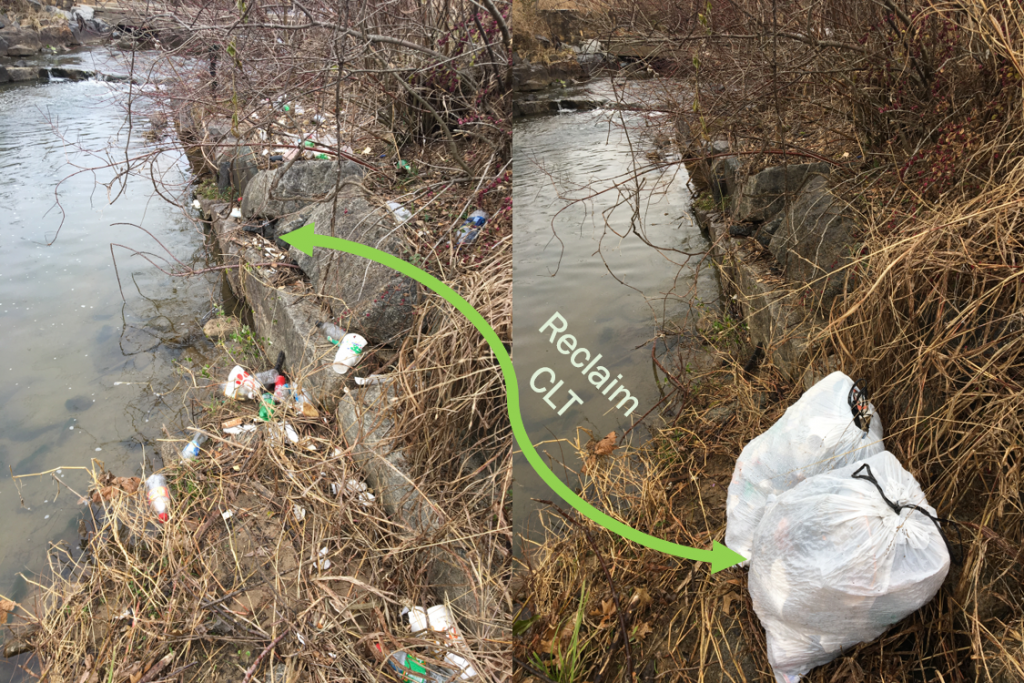
Image c/o Caroline Burgett
Caroline Burgett’s career has been dedicated to environmental stewardship of urban natural resources. Charlotte is a city of over 3,000 miles of creeks, and Caroline serves as a resource for residents’ needs surrounding this abundant resource as an employee of Charlotte-Mecklenburg Storm Water Services and a citizen board member of Keep Charlotte Beautiful. She says that the ECC fellowship and 8 80 Cities’ perspective provided her with additional insight and momentum to better evaluate and engage her community each day.
Caroline’s ECC project, Reclaim CLT, seeks to continue the narrative on plastic pollution in Charlotte’s waterways. Over the last year, Reclaim CLT has held monthly group cleanup events around the city, providing 125 volunteer hours removing 3,445 pounds of trash from local streams. Leveraging other initiatives in the region, Caroline hopes to bring this issue to the neighborhood level, engaging residents through an upcycled environmental art exhibit expected to launch in early 2021.
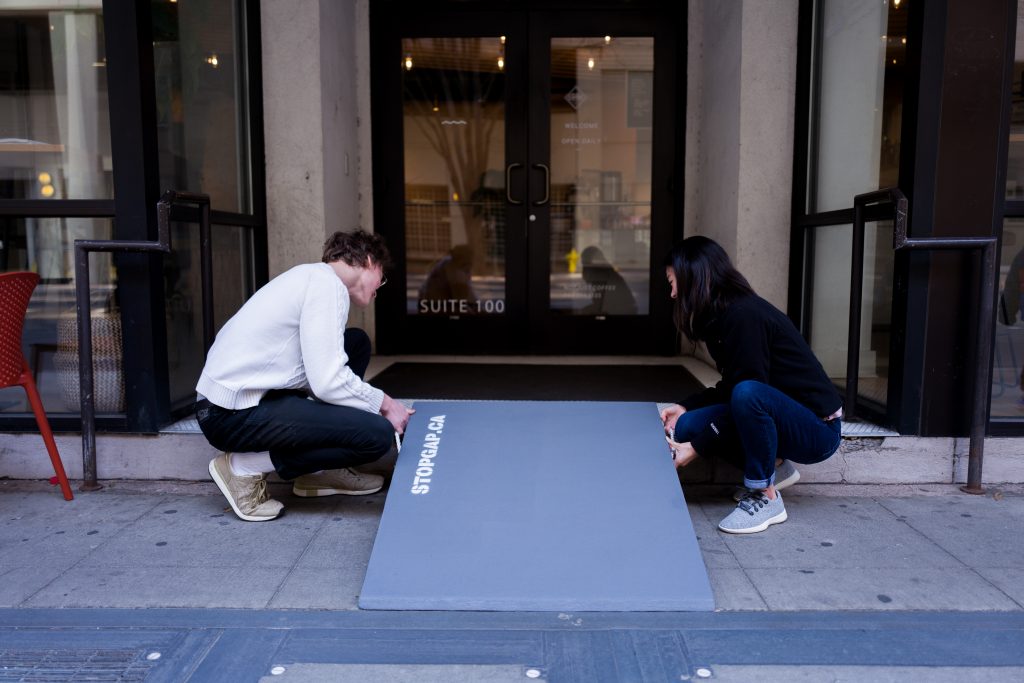
Image c/o H. Lyn Kim
H. Lyn Kim holds a Bachelor of Health Science from the University of Florida and a M.S. in Occupational Therapy from Washington University in St. Louis. With a background in local government and a medtech startup, Lyn delights in working at the intersection of community engagement, inclusive design, and accessibility beyond compliance. She loves a good challenge and has the persistence to navigate complexities through creative problem solving and relationships. As a member of the Sandwich Generation, Lyn enjoys community activities with her husband, son, and parents.
For her ECC project, Lyn saw the need for accessible and inclusives places and spaces for people with disabilities in Charlotte, NC. In response to WalletHub’s 2019 list, “Best and Worst Cities for People with Disabilities,” which ranked Charlotte 160 out of 182 cities in the U.S., Lyn founded GO CLT to increase access to public spaces, businesses, and events through outreach, advocacy, and community engagement. Her goal was to address accessibility on a community level through the lens of inclusive design. For GO CLT’s first initiative, she partnered with Stopgap Foundation to bring their Community Ramp Project to Charlotte. Her key challenge was to develop relationships to increase awareness on the ADA, physical barriers, and promote equitable access beyond compliance to local businesses. Through the ramp project, GO CLT built custom removable ramps for two local businesses with a single step entrance prior to the COVID-19 Stay at Home order.
Despite having to make multiple adjustments during a pandemic and racial injustice, GO CLT partnered with the City of Charlotte to provide ramps as needed for the City’s Temporary Outdoor Dining Program during Charlotte’s Phase 2 Safer at Home order, which allowed restaurants to reopen at 50% capacity. The next steps for GO CLT is to continue to provide custom removable ramps to local businesses with a single step entrance and serve as an advocate and resource to address barriers and help build a more accessible city.
Catch up on other ECC 2019 projects all week on our Stories & Insights page and learn about the new ECC 2020 cohort at emergingcitychampions.org/meet-champions.
